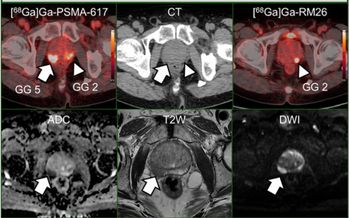Macrocyclic gadolinium-based contrast agents (GBCA) are increasingly preferred to a linear GBCA in pediatric hospitals, according to a study published in the journal Pediatric Radiology. Researchers from Northwestern University in Chicago, Ill., and the University of Arizona in Phoenix sought to determine how pediatric hospitals were using gadolinium, as well as learn more about the knowledge base among radiologists and referring providers regarding GBCAs and brain gadolinium deposition. The researchers sent out surveys to 5,390 physicians in various pediatric professional societies between January 2016 and March 2016. The groups included the Society of Chairs of Radiology in Children's Hospitals (SCORCH), the Society for Pediatric Radiology, the Pediatric Endocrine Society, as well as a group of pediatric neuro-oncology attending physicians, pediatric neurology attending physicians, and pediatric infectious disease program directors. The results showed 80 percent of surveyed pediatric hospitals used macrocyclic contrast agents and within the last year, 58 percent switched their agent, most commonly to gadoterate meglumine. The most common reason given was concern about brain gadolinium deposition. Another 23 percent of hospitals were considering switching. Of these hospitals, 83 percent would switch to gadoterate meglumine. The most common reasons given for the switch were brain gadolinium deposition and safety. Radiologists were more aware of brain gadolinium deposition than non-radiologist physicians (87 percent versus 26 percent). Radiologists and referring providers both expressed similar levels of concern (95 percent and 89 percent). In addition, 12 percent of radiologists and 2 percent of referring providers reported patients asking about brain gadolinium deposition. Radiologists were significantly more comfortable addressing patient inquiries than referring pediatric physicians (48 percent versus 6 percent). The number of MRIs requested by referring pediatric physicians correlated with their knowledge of brain gadolinium deposition, contrast agent used by their hospital, and comfort discussing brain gadolinium deposition with patients. The researchers concluded many pediatric hospitals have switched to or plan to switch to a more stable macrocyclic MR contrast agent, most commonly gadoterate meglumine based on the discovery of the presence of brain gadolinium deposition. “Despite this, there is need for substantial further education of radiologists and referring pediatric providers regarding GBCAs and brain gadolinium deposition,” they wrote.














